
1919
In 1919 enginemen saw the introduction of the 8 hour day and the L.B.S.C.R. was obliged to
abandon its time honoured tradition of 'one driver, one engine' - quite simply it ceased to be
an economic proposition. Thereafter the best compromise (circumstances permitting) was to
introduce 'double manning' with each engine allotted to a pair of drivers on opposite turns
(one early, one late). under this system the locomotive was, in effect, available for about 16
hours in every 24 hours.
The working of the locomotive would then be done by these drivers with the exception of
leave, rest days, sickness etc. when the engine would have been worked by other designated
Enginemen. The practice of painting the drivers name onto the weatherboard then ceased.
But double manning didn’t suit everybody and there was many an old stalwart who in 1919,
would gladly have stuck to the 10 hour day in order to keep his own engine to himself.
LANCING CARRIAGE WORKERS STRIKE
2nd - 11th JANUARY 1919
SEE SUB PAGE
Selhurst Branch of A.S.L.E. & F. was founded
In a New Year letter to branches, dated January, 1919, the General Secretary Mr. Bromley wrote
" The great European War is ended, and our members will be shortly returning from Army Service to their old occupations, and they will have to admit that our Society, at least, has not forgotten them, or been idle in efforts for their welfare during their absence ; for not only have we kept unbroken their membership without contribution, and cared for the dependants of the fallen, but have prepared a better footplate life for them on their return. They will come back to an eight hour day, greatly increased wages, standardisation of conditions of service, and great improvements in footplate life generally. We have emerged with an increased prestige, a broader outlook, and with fixed intentions for the future."
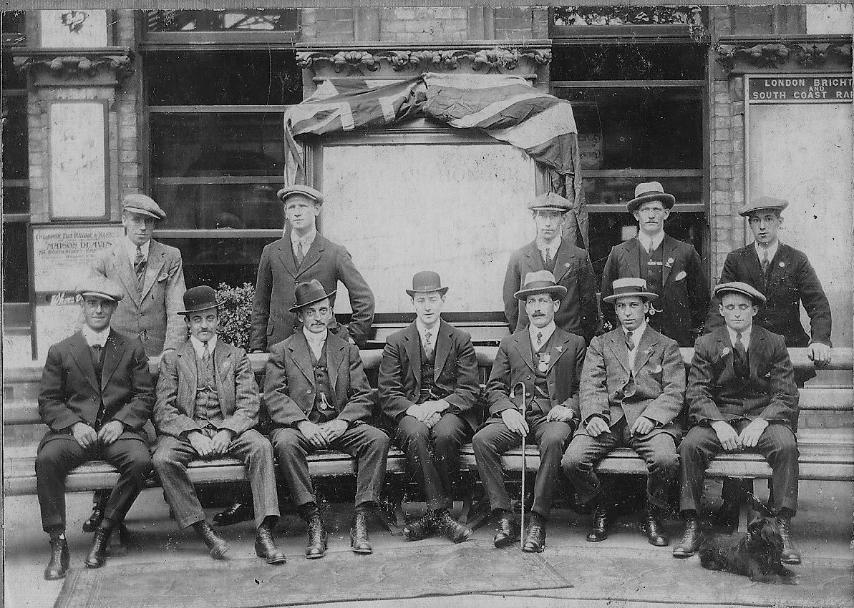
No longer were we warned to lower the blinds, and to hide all light by night, end to be on to guard about saying anything to anybody else. The nerve racking terror of air raids had gone, and there was even a prospect of better bread soon, although butter was but a memory of long ago. The year 1919 saw some re-introduction of the old railway facilities, which had been gradually narrowed down from 1916 onwards. Express trains were decelerated in that year, and restaurant cars withdrawn, and 1917 saw even more drastic changes, including a restriction of luggage, an increase of fares—a withdrawal of cheap fares and an increase of fifty per cent, in ordinary fares a reduced service the closing down of many stations and halts, and the entire withdrawal of some train services. The railway had become familiar with the presence of women engine cleaners, guards, gate-keepers, porters, carriage and engine and even ticket inspectors. When in 1919 there came a mighty releaseof men, new light and life came, albeit England was still only a sorry comparison to its former self.
After the war the amount of staff employed on the railways was about 17,000 less than in 1913, and yet accidents had decreased. The various railway companies had released 180,796 of their men for service in the forces, equal to about 30 per cent, of their employees. Special railway units dealing with military railway construction and operation took 24,176 of these men.
On Saturday 1st February 1919 the 8 hour day was finally implemented for enginemen
throughout the country although the Board of Trade reinterpreted the agreement to exclude
meal times for motormen. The motormen employed on the London Brighton and South Coast Railway and on the District and the Metropolitan Railways of the London Underground were expected to work a full 8 hours without a meal break.
On Sunday 2nd February, A.S.L.E.F. motormen on the L.B.S.C.Railway went on strike along with the motormen on the London Underground with the threat of the rest of the 42,000 members to join the strike to force the principle of a paid meal break for all enginemen and motormen.
A serious intervention was the strike of London Electric Trainmen. The Executive had met the Railway Executive on January 7th, to adjust problems which might arise in the operation of the eight hours day, when it was understood that meal-times should continue until more evenly adjusted during the national negotiations. It was also understood that where brief meal reliefs had been given to electric trainmen, or brief stoppages on busy shunting engines for meals, the same would continue pending national negotiations. On January 30th, the President (Mr. Cooke)and General Secretary were informed by Sir Albert Stanley that the negotiations would commence on February 12th, and that an arrangement had been entered into with the N.U.R., and signed, dealing with the question of meal-times and overtime. It contained the following clause :-
" In calculating the eight hours, time allotted for meals will not be counted in cases where time has hitherto been so allotted, for example :—
1 .—A man hitherto booked on at 6, and working continuously until 4, will, if booked on at 6, cease working at 2; or, if he works later, will be paid overtime rate from 2.
2.—A man hitherto booked on at 6 and working until 5, with a meal hour between (say) 1 2 and 1 , will, if booked on at 6, cease working at 3 (with an hour meal interval) ; or, if he works later, will be paid at overtime rate from 2.”
Sir Herbert Walker was then called in, and it was understood that it only affected shedmen who had regular allotted meal-times upon which Mr. Bromley signed. Sir H. Walker then said he considered it should apply to electric trainmen, to which reply was given that it would then cause serious trouble. It afterwards transpired that before the Society knew of the agreement, instructions had been issued on the electric companies that no meal reliefs were to be given with pay, and that there was to be an actual eight hours working day. Further, the L. & S.W. service conditions interpreted the agreement so that overtime on the eight hours day would only be paid at ordinary time rate. Friday, January 31st, was spent in negotiation with the electric railways, with Sir A. Stanley and Sir H. Walker, but the Railway Executive would not concede the claim of the Society, holding that it must be an eight hours working day, with no pay for meal reliefs.
Members on all the London Tube Railways struck on Sunday night, February 2nd, followed by the motormen on the L.B. & S.C.R., the District and Metropolitan remaining then at work. The Executive met on the following day, and made the strike official, calling out the members on the District Railway in support of those on the Tubes. Next the Executive decided to call out all steam men on the L.B. & S.C.R., and all the members on the L. & S.W.R., to prove their determination on this principle, and promised, if necessary, to follow this with a national strike of all the 42,000 members.
The District men struck and closed the line at once, and at the appointed hour the L. & S.W.R. men and the L.B. & S.C.R. members did the Same. The arrangement worked with wonderful precision, and London became totally dislocated and undone. Extra ordinary scenes were witnessed on the streets, every sort of vehicle being pressed into service, and still many thousands had to walk. A meeting was arranged with Sir A. Stanley at 3.30 p.m. on February 5th, and it continued until 9 p.m. On the following day the Railway Executive and Sir Robert Home (Minister of Labour) attended the Conference, and on February 7th all members were to be called out, but at nearly midnight the opposition yielded the claim " that no break whatever should take place within the eight hour day, with payment therefor," but contended that the break or relief should not be called a meal time. The following agreement was then made :-
" The Underground Trainmen to be booked on for eight hours work. Meal time will not be included in the eight hours, but in the new conditions of the eight hours day the companies will offer all reasonable facilities to meet the ordinary physical needs of the men."
The A.S.L.E.F. Executive met on Monday 3rd February and sanctioned the action and called
out all the Engine men on the L.B.S.C.R. (Peckham Rye, Crystal Palace, & Selhurst) as well as all Motormen on the District Railway and on the L.S.W.R. (*Waterloo, Hounslow,
Hampton Court, Wimbledon Park (Durnsford Road ) & Strawberry Hill ).
About 75% of all Enginemen and Firemen on the L.S.W.R. came out on strike in support from London to as far west as Exeter and Plymouth.
On Friday 7th February the Railway companies capitulated and an agreement with
A.S.L.E.F. was reached where 30 minute paid meal breaks would be provided for Motormen.
In spite of the settlement the drivers and firemen belonging to the A.S.L.E.F. had not returned to work, this was owning to the decision had only been reached at such a late hour on Thursday night, and there had not been time for it to be officially communicated to the
A.S.L.E.F. membership at Brighton and other branches within the L.B.S.C.R. By the Saturday a near normal steam was being operated, but owing to the absence of motormen, only a curtailed service of electric trains was in operation.
The Drivers and firemen who belonged to the National Union Railwaymen continued to work normally during this dispute.
* Motormen's depots that were open in February 1919.
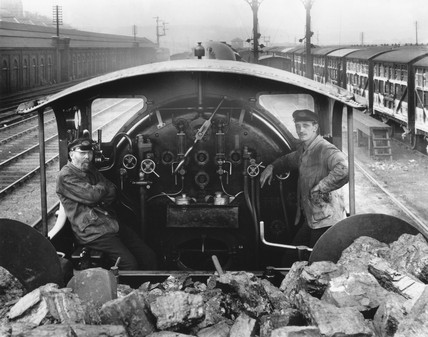
Extracted and adapted from
Newhaven Special Branch Meeting
Thursday February 6th 1919
Owing to the Secretary having received a letter from the General Secretary calling our members out in support of the Electric Motormen who were on strike over the question of food time during the 8 hour day.
Brother F. Sherwin was in the chair and a fair number of members present including two N.U.R. Loco-men, after correspondence had been read and telegrams from Brighton Branch.
Some discussion took place, and the Secretary reed rule 24 to the members. It was moved by Bro. F. Wilmshurst & Seconded by A. Stoner.
"That meetings be held at 12 noon at the White Hart (Carried Unam) Strike Committee:- Bros. A. Leonard, F. Sherwin, W. Goldsmith, Proposed by F. Wilmshurst & Seconded W. Goldsmith. That F. Harris be on Committee. Pro. F. Wilmshurst & Sec. F. Harris that H.G. Bowden be on the Committee.”
(Carried Unam.).
The Secretary stated that he received the letter on Wednesday afternoon not in time to arrange for meeting the same day, and that he see our Chairman and Bro. Wilmshurst in reference to it, and that they agreed that if called upon to do duty on the next day other than their booked turn of duty they would refuse, it happened on Thursday morning that our Secretary was called upon to work a passenger train usually worked by Brighton men and he had refused to work it, but finished his own turn of duty.
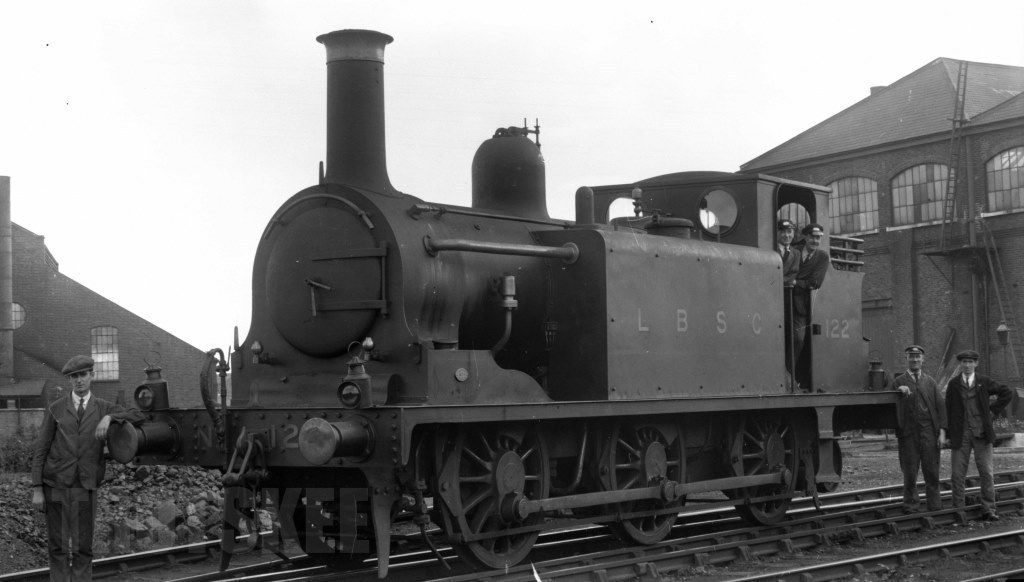
PHOTOGRAPHER UNKNOWN
NEWHAVEN ENGIMEMEN
This photo was probably taken in c1919, when double manning of locos were introduce as a result of the introduction of the eight hour day being implemented. Each loco prior to 1919 had one dedicated driver and after 1919 the loco was shared between to dedicated drivers.
THREE BRIDGES WORKINGS
During the 1914 - 1918 War, and the 1919 agreement which limiting the engine men’s hours to an eight hour day, changed the pattern of freight working on the L.B.S.C.R., and had a profound effect on the work of Three Bridges shed. The former London North West Railway (L.N.W.R.) and Great Western (G.W.R.) locomotives to Three Bridges until 1921, when the L.B.S.C.R. took over the workings which continued until after the Second World War. The early morning trip from Three Bridges to Old Oak common and back was always worked by an E4. The Willesden trip which started from Three Bridges in the late evening was worked by a Three Bridges engine Class C2/x until the Class K was allocated, when they were used. It was always worked by Three Bridges men, although for a short tine the 1930s, the diagram was part of Brighton cyclic working, The reduction in enginemen’s hours resulted in goods being based on starting from yards and working out instead of depots like Midhurst & Tunbridge Wells working in.
LOCOMOTIVE JOURNAL
FEBRUARY 1919
SELHURST BRANCH
The first General Meeting of the above branch was held on Sunday, January 12th, when we had a very good attendance and a most enjoyable time. That our members are fully alive to the situation as it now stands is shown by the following resolution:-
(1) "That the Selhurst Branch place their confidence in and give their hearty support to our General Secretary and Executive Committee in the just demands set forth in the National Progamme."
(2) "That we instruct our E. C. to negotiate with the Tax Commissioners with a view to having the Income Tax removed from men earning less than £250 per annum."
(3) "That we are of the opinion that the extra week's holiday asked for in the National Programme should be granted us on the basis of having to work all National Holidays."
These resolutions were carried unanimously. The election of Officers then took place, our Chairman and Secretary being re-elected, and accorded a hearty vote of thanks for their good work. After discussions on various topics we gave a hearty welcome to three new transfer members from the N.U.R, one in that Society for over 16 years. This is indeed a good start for the New Year
H.E. Cooper
LOCOMOTIVE JOURNAL
1919
HORSHAM BRANCH
Sunday, 4th May, was a red letter day in the annals of the above Branch, when Bro. Ivor Gregory addressed an Open Meeting of railwaymen and their wives in the afternoon, and presented Bro. G. Merritt, the Incapacitation Grant Benefit of £100, and £76 5s., the result of a draw. The Assurance fund Benefit of £38 having been handed over previously. Bro. G. Merritt had unfortunately lost his right foot, owing to accident at Brighton, on September 18th. Bro. G. Merritt made an eloquent speech, which was greatly appreciated. A vote of thanks was moved by Mr. G. Shears, A.S.L.E.F., seconded by Mr. A. Streeter, N.U.R., to Mr. Gregory for his splendid address; and to Mr. J. Cordery, of Battersea, for taking the chair.
An Opening Meeting of Locomotivemen in the evening was addressed by Mr. Gregory. a brief account of the progress of this Branch for the first four months is as follows:-
"New members, 3;transferred from N.U.R., 3 (one with over 24 year's membership in the N.U.R.) transferred to Full Benefit, 6; Assurance Fund members, 9; Death and Retiring Fund,12; Orphan Fund, 1; increase for sale of Journals,10. The number of N.U.R. at this depot are three, one aged 67 (still driving), one over 59 and one Fireman; whilst there are no "Nons."
May every Branch in England, Ireland, Scotland and Wales, soon be able to possess a better record than this, and then we shall get our rights which we have so long waited for.
BRANCH SECRETARY
PHOTOGRAPHER UNKNOWN
LOCOMOTIVE JOURNAL
1919
BRIGHTON BRANCH
We have been living in very trying times here recently, in that we have been involved in two
disputes: Lancing and Electric affairs, about 200 taking part in the electric affair. We have
emerged successfully, as since January 1st we have received over 100 Entrance Fees, a good
proportion joining as Full and Half-benefit Members, with a few transfers. As our men are
being de-mobilised and others taken on as Cleaners, and are joining us, we are now 300
strong.
Now that we are looking forward to a little more leisure, we hope the members will be able to attend the Improvement Class more regular, as besides the mechanical side of our
work, we hope to be able to take up other subjects. We are also looking forward to a
clubroom of our own, which will be open to our members every day of the week.
Mr. Stevenson (E.C. Member) was here on Sunday, March 30th, and gave an account of the
recent negotiations on the National Programme. The following resolution was carried
unanimously:-
"That after hearing a report from Mr. Stevenson (E.C. Member) re negotiations on our
National Programme and the Government's proposed Standardisation of Conditions of
Service, we hereby express our appreciation of the General Secretary and Executive
Committee in the way they have carried out the negotiations, and are confident that they,
having secured by their policy a Locomotive Committee to deal with Engineman's Wages,
etc., will safeguard our interests, and raise the general status of Enginemen, and are of the
opinion that this should be the final step to the A.S.L.E. & F. representing the Loco. men of
the United Kingdom”
BRANCH SECRETARY
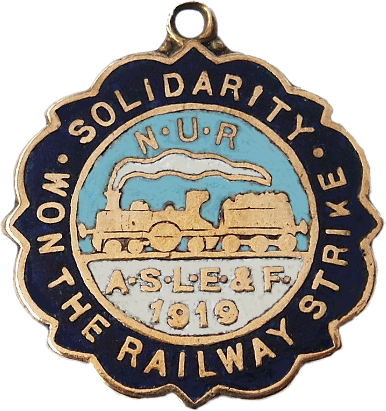
LOCOMOTIVE JOURNAL
1919
HORSHAM BRANCH
An open meeting for drivers, firemen and cleaners was held at the Mission Hall Barrington Road, on Sunday, September 17th, at which Brother J. Payne, ex-chairman of our branch was elected to preside. After a few well chosen remarks, he referred to the Conciliation Scheme and recent delegations. He then called on Mr. Warwick our organizing secretary, who addressed the meeting for over an hour, to the greatest satisfaction to every one present. His subject was "The Conciliation Boards and the recent crisis." I was sorry we had not a larger attendance, but was pleased to see our representatives from Brighton, Portsmouth, Littlehampton and Midhurst. After the usual vote of thanks to the chairman and Mr. Warwick, we brought a very pleasant meeting to a close.
BRANCH SECRETARY
PHOTOGRAPHER UNKNOWN
St. Leonards
LOCOMOTIVE JOURNAL
1919
HORSHAM BRANCH
I much regret to report the death in France, on November 23rd, of Bro. A. Mitchell, a Cleaner Member of this Branch. Bro. Mitchell joined the Army in August, 1914, and after having gone successfully through the whole fighting was taken ill with bronchial-pneumonia, and died in hospital.
I also have to report the death of Bro. J. Francis who was killed in action on October 11th. He joined the Army in May, 1917, at the age of 19 years, having been released for the purpose. He leaves a widowed mother to mourn his loss, who wishes to thank all members for the kind sympathy shown, and for the prompt payment of the Death Benefit from General Office
BRANCH SECRETARY
Railway accident on the
L.B.S.C.R.
BRIGHTON LOCOMOTIVE DEPARTMENT
FIRE BRIGADE
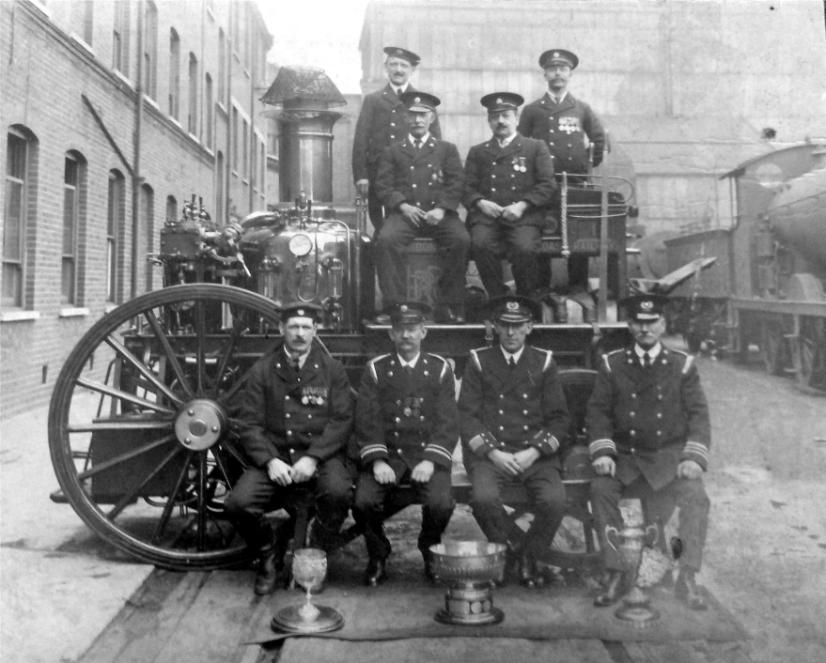
NICKIE PRESTON COLLECTION